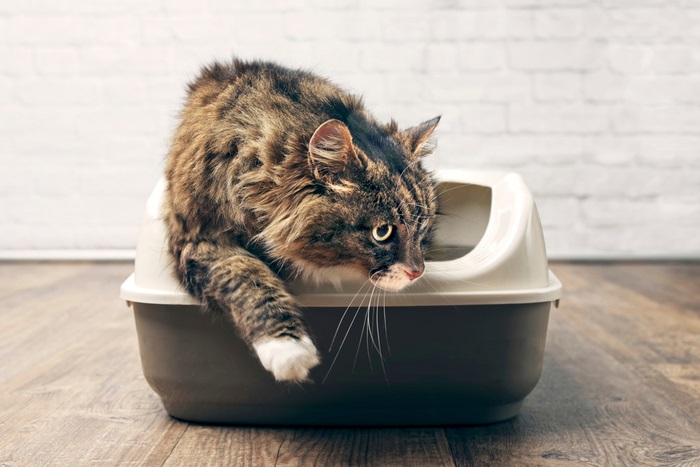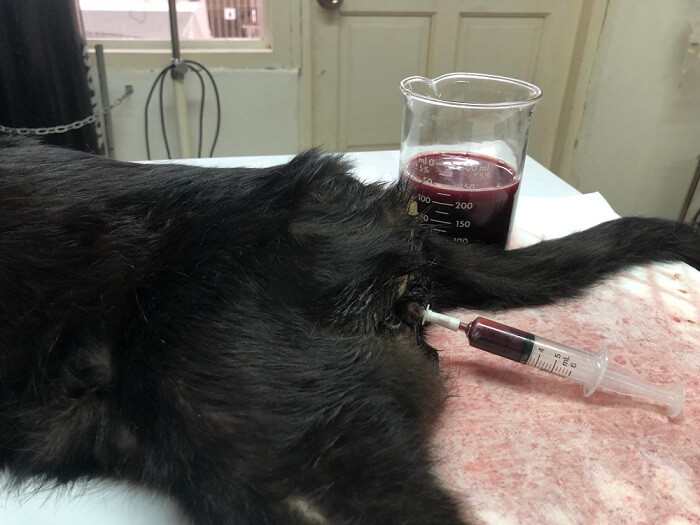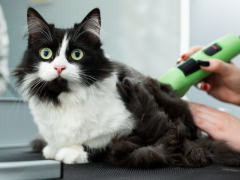
If your cat has started urinating blood (officially termed ‘haematuria’), it’s likely you’re worried. You should know what peeing blood can mean, how to treat urinary problems in cats, and when to contact the vet so that you can give your cat the best care.
Quick Overview: Blood In Cat Urine (Hematuria)
 Urgency: High
Urgency: High
 Requires Vet Visit: Yes
Requires Vet Visit: Yes
 Seen in Cats: Frequently
Seen in Cats: Frequently
 May be Linked to: Urinary tract infection, feline idiopathic (interstitial) cystitis, bladder stones, bladder tumors, kidney stones, kidney infection, kidney cancer.
May be Linked to: Urinary tract infection, feline idiopathic (interstitial) cystitis, bladder stones, bladder tumors, kidney stones, kidney infection, kidney cancer.
 Treatment Options: Antibiotics, pain medication. Surgery for bladder stones. In cases of cancer, surgical or medical therapy may be available depending on the tumor type.
Treatment Options: Antibiotics, pain medication. Surgery for bladder stones. In cases of cancer, surgical or medical therapy may be available depending on the tumor type.
Causes of Blood in Cat Urine
Your cat’s urinary system starts at the kidneys. Urine produced here moves through the ureters and is stored in the bladder until it is voided through the urethra and into the tray.
Things can go wrong with any part of this system to cause blood in your cat’s urine. The most common problems occur in the lower urinary tract (the bladder and urethra) and form a spectrum of diseases called ‘Feline Lower Urinary Tract Disease’ or ‘FLUTD’.
The Kidneys and Ureters
The kidneys and ureters are a rare cause of feline haematuria. Kidneys suffering from failure can bleed, especially when the cat also has high blood pressure. Cats can also suffer from kidney and ureter tumours. Compared to haematuria from the bladder or urethra, bleeding from the kidneys and ureters is rare.
The Bladder
Most possible causes of blood in your cat’s urine happen in the bladder and can include bladder tumours, bladder infections, and bladder stones. However, the most common cause of blood coming from the bladder is Feline Idiopathic Cystitis, or ‘FIC’.
Feline idiopathic cystitis can only truly be diagnosed when all the other causes of cystitis have been ruled out, but it’s often presumed in young and otherwise healthy cats because it’s so common.
We don’t yet fully know why it happens, but we do know some things- it appears to be linked to stress, and is more common in indoor, overweight, female cats on a dry diet. In FIC, the cells of the bladder wall are usually defective, having too little glycosaminoglycans to work properly. And stress causes nerves in the bladder to be stimulated to release neurotransmitters that increase inflammation.
Bladder infections do occur in cats, but much less commonly. Normal feline urine isn’t a good place for bacteria to thrive, so an infection often has an underlying cause such as diabetes or renal disease, where the urine is changed to the benefit of the bacteria.
Stones and crystals can also form in your cat’s bladder.
Whilst crystals pass without harm, stones can cause major irritation and inflammation, and pave the way for more serious infection. The cause of bladder stones is not fully understood, but a combination of dietary factors (such as diets with high mineral content), a sedentary lifestyle, obesity, and concentration of urine can lead to disease.
The Urethra

Blood in cat urine is most often caused by issues in the lower urinary tract (from the bladder to the urethra), but it may also stem from the kidneys and ureters.
The urethra is the tube that connects your cat’s bladder to the outside world, therefore anything that goes wrong with the bladder usually affects the urethra too.
The most common things to go wrong with the urethra are inflammation caused by FIC or by the movement of bladder stones or ‘uroliths’. Infections are also possible, but as with bladder infection, urethral infection is rare.
The urethra can also become blocked by a stone (and/or by a ‘plug’ of mucus in the male cat), which stops the flow of urine altogether. This is an emergency, and your cat will likely be very uncomfortable, straining, crying, and visiting the tray but producing nothing. A ‘blocked’ cat can become fatal within a few hours, so if you see these signs you should visit the nearest open vet as soon as possible.
What To Do if Your Cat Has Blood in Their Urine?
If you notice your cat has blood in their urine, it’s time to talk to your vet. If possible, you should get a sample of the urine to take for testing.
This can be done by using a special non-absorbent cat litter. Alternatively, if your cat has peed in the bath or on a tiled floor, you may be able to suck it up with a pipette or syringe. If you can’t get a sample, don’t worry- your vet may be able to get one for you.
Try to get an appointment within the next 24 hours, as many conditions causing blood in the urine of cats are painful.
Your vet will want to examine your cat and feel their bladder. If this is the first time your cat has had this problem, you and your vet will need to discuss whether to investigate further, or whether to trial treatment for FIC. Whether this is appropriate will depend on your cat’s age, gender, and other symptoms.
Further investigations are likely to involve urine tests, ultrasound exams, blood tests, and even x-rays.
Treatment for Urinary Tract Disease

Treating blood in your cat’s urine should address the underlying cause of the haematuria. For cats with a urethral blockage, treatment is urgent and involves catheterization.
The exact treatment your cat undergoes will depend on their symptoms and final diagnosis. For the most common cause- cystitis- there’s no specific treatment. Instead, symptoms are controlled using anti-inflammatories.
Herbal supplements are available that may help the bladder lining, but most of these have little clinical evidence to back their use. Since FIC is associated with stress, calming supplements may also be of use.
Of course, if your cat is suffering from another type of urinary tract disease, treatment might differ. Cats with infections, for instance, will need antibiotics, as well as treatment for the underlying cause. Cats with urinary stones may need a special diet to help reduce the crystals in the urine, and these stones may need to be removed surgically.
Cats with a blocked urethra will need ‘unblocking’ urgently- by passing a urinary catheter under general anaesthetic. And cats with bladder tumours may have chemotherapy or surgery as an option- although whether this is appropriate for your cat is a decision for you and the veterinary surgeon to make together.
In all cases, increasing your cat’s water intake is an important part of treatment. You can do this by switching your cat to wet food, by adding water to your cat’s dry food, and by encouraging drinking using a variety of bowls and fountains scattered throughout the house.
There is some new evidence that suggests that ‘water supplements’ may increase hydration in cats too- so that’s something to look out for in the future.
Also Read: How Much Water Should a Cat Drink?
Conclusion
Urinary tract disease is very common in cats. Whilst all parts of the urinary system can be affected, the most common cause of blood in the urine is idiopathic cystitis, or FIC. Cats with FIC are prone to recurrent attacks, and it can be painful. Knowing the signs, and knowing when to take your cat to the vet, is the key to fighting this painful condition.
Frequently Asked Questions
What does blood in my cat's urine mean?
Blood in your cat’s urine could mean an infection, inflammation, bladder stones, a bladder tumour, or some other form of urinary tract disease. It should be investigated by a vet to find out what is wrong.
Is a cat peeing blood an emergency?
A cat peeing blood is urgent, but not an emergency- as long as they remain well in themselves. It can be dangerous if left untreated and it’s probably painful, so they should see the vet within 24 hours. However, if your cat stops urinating and starts straining at any point, this should be seen as an emergency.
How do you treat a urinary tract infection in a cat?
Urinary infections should be treated with antibiotics from your vet. However, it’s important to remember that many problems that look like a UTI might not be, as urinary infections are rare in cats. Therefore, antibiotics should only be given if your cat’s urine has significant numbers of bacteria.
Is cat UTI an emergency?
A UTI is not an emergency in cats. However, it should be seen within 24 hours as it’s likely to be uncomfortable. If your cat stops peeing and starts straining and yowling, especially if your cat is male, then it is an emergency and you should call the nearest open veterinary clinic for advice.








Hello, My old siamese had a problem with blood in her urine a few years ago. She was treated with abx, and other than a few loose stools she seemed fine. Her doctor said the urine culture was clean. Now she’s got blood in her urine again. She was given abx again, and the bleeding stopped. When the abx were done, she started bleeding again within a day or two. The doctor once again said the urine looked ok during the follow up. Then, the blood showed back up and she is going in tiny amounts. What to do?
Hi Dana, unfortunately, this is something that you will need to discuss with your vet, as they have a better understanding of your cat’s unique situation and needs. Has she received a diagnosis of urinary tract infection based on a urine culture, or is there another diagnosis? This will guide the appropriate treatment path for your cat.
my girl cat is bleeding once and awhile what is ther problem
Hi there. There are a lot of potential issues at play—sounds like it could be cystitis, but I would advise a trip to the vet.
My cat has had FIC for 6 years. It first developed after a move with many new noises and stressors. After moving again that same year the bleeding episodes eventually stopped. She had none for a couple of years then it started again for no apparent reason and was a monthly occurrence for almost a year. Now it is sometimes even more often than once a month. A couple of times she has repeatedly peed outside of her box with no signs of blood but is now bleeding in her urine again. I have given her gabapentin (during flare ups) and urinary tract canned food for years. It is a mystery that it is so regular now after coming to a stop previously.I have also used Feliway sprays and diffuser with no change plus calming treats periodically. What else can I do for her diet?
Hello Rae, thanks for the comment. This is quite a tricky question, and I’m not sure that I have the expertise to give you a proper answer. It sounds like you’re doing everything you can to get this under control. A talk with a veterinarian may be in order. Apologies for the lack of a concrete answer! Hope your cat feels better soon.
Thanks Mallory,
Unfortunately the vet has only prescribed the urinary tract food, including canned food to add moisture to her diet, and the gabapentin to help with the pain during the episodes. We have been to 2 different veterinary offices but the vets were already at a loss for what else to do before the episodes became monthly and predictable. Thanks for your response anyway.
There now are cat litters that show whether there is blood in the urine. i recently purchased Pretty Litter and it immediately turns pink. or even red, when there is blood in the urine.
Hi Judy,
My car just started taking medication for urine infection, he is now passing blood is this normal?
I am very concerned
Hi Judy,
Any time you see blood in the your cat urine is a red flag and a cause for concern, your cat most likely needs to see a vet so we recommend to consult with your vet on how to best handle the situation.
How long does it take for Antibiotics to take effect on cats ? Mine has been 3 days?
It depends on the type of antibiotic, but they will generally start having an effect within the day, and you should start seeing results within several days. Most vets will recommend 7-14 days of antibiotic therapy.
I’m curious as to how can you tell if there is blood in the urine when the cat uses a litter box and it mixes with the litter.
Hi Judy, good question! While blood is sometimes apparent, you’re right—there are occasions when you won’t be able to see it after your cat covers their waste. It’s just a matter of catching it at the right place and time.
I found that using a piece of toilet tissue, dabbed on the littler can show if there is blood in the cats urine, – but if this is the case, then a colletion is necessary to take to the vet immediatly – you can collect by lifting its tail a little and catching in a small plastic container, only a little is required ( approx) 1 tablespoonful